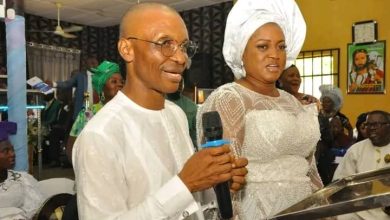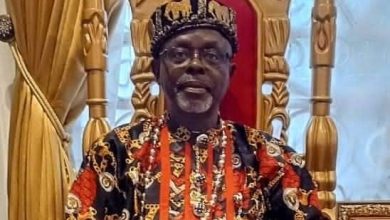Society Watch
Ibeno Communities Trained on Peace Building, Sustainable Environmental Practices
...as PPDF Exposes communities to production, usage of fuel-wood efficient stoves
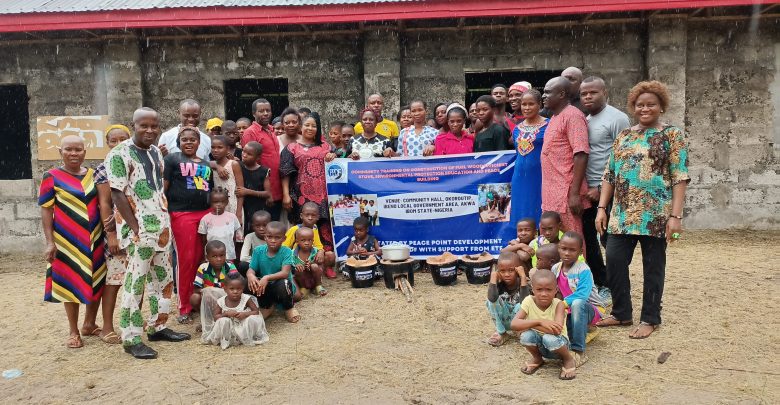
Through the initiative of Peace Point Development Foundation, PPDF, with support from Energy Transition Fund, ETF, over 80 persons from three communities in Ibeno local government area have been trained on peace building and sustainable environmental practices.
Ibeno local government area is one of the leading oil and gas producing areas in Nigeria, a status that has caused deep environmental challenges and conflict to the area.
Peace Point Development Foundation in a bid to mitigate these challenges gathered selected members from three communities of Mkpanak, Inuaeyetikot and Okoroutip at Okoroutip Community hall, Okoroutip in Ibeno local government area for the training.
The 3-day training which took place on Thursday, May 19 through Saturday, May 21 2022 at within resources persons speak to participants on peace building, sustainable environmental practices coupled with training on the production of fuel-wood efficient stoves.
The Executive Director, Health of Mother Earth Foundation, HOMEF, Nnimmo Bassey, who took participants on ‘Sustainable environmental practices
noted that it was time community members take up the responsibility of forming alliances with other communities, organizations to report any oil and gas exploration problems witnessed in their environment.
Bassey said the need for communities to develop more interest in happenings in their environmental pollution is to forestall worsening conditions of environmental hazards.
On his part, a resource person, Stephen Oduah, said the oil and gas communities need to act like citizen journalists especially in the monitoring of issues of gas flaring, oil spillage among other environmental ill-practices for timely correction to mitigate against further occurrence.
Oduah recommended that the communities should go beyond just reporting but also seek for the cause of the hazard, those involved and persons most affected.
In his remarks, the Coordinator of PPDF, Mr Umo Isua-ikoh said that for peaceful coexistence and amicable conflict resolution, community members should learn to see things from others’ perspective, putting into cognizance how the affected party would respond to issues which affects them directly.
“ Everyone can see a problem from different angles based on where you are looking from, unless you put yourself in another’s shoes, you can’t feel or understand what they feel or see”, he said.
PPDF Coordinator noted that the training will also afford the communities opportunity to be shown how to produce and use fuel efficient stoves in order to reduce high demand for fuel wood thus improving health and reducing greenhouse gas emissions in the environment.
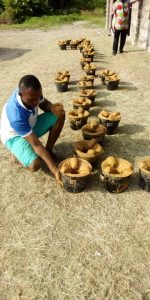
He explained that evaluation of fuel-efficient stoves confirms that improved mud stoves have a beneficial impact in terms of enhancing livelihoods, nutrition and health, forest conservation and environmental protection, and fighting climate change by reducing carbon emission.
Isua-iko said ” The use of Firewood can overwhelm some spaces, and the fuel efficient stove presents a great alternative. The lesser use of firewood prevents further deforestation and produces far less smoke than traditional fires, reducing the incidence of respiratory diseases.
“Furthermore, the design of the stoves reduces the safety risks, such as fires, when used inside houses. In addition, the materials used to make the mud stoves are available locally, helping to improve levels of replicability and cost-efficiency of the practice.”
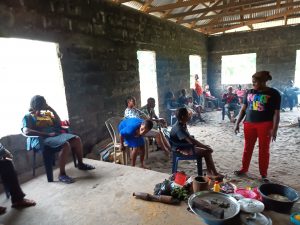
Bassey Asuquo and Gideon Jaja who took the participants on practicals on how to construct the stove using clay, sawdust and water with the aid of an aluminium mould charged the participants to extend the knowledge to others.
Meanwhile, participants were divided into groups to test-run the fuel efficient stove on the third day through cooking highlighting its effectiveness.
Commenting on the impact of the training and the difference of the stove with other cooking fuels, beneficiaries in their respective remarks noted that they now have expertise in producing the stove.
The Secretary of Ibeno Beach Management Board and participant in the training, Mr Emem Enyenemkpo, said although several trainings of this nature were brought to the community, it was the first time they were engaged practically.
He noted that from his observation, the stove is preferred to other fuels, especially its little wood consumption rate.
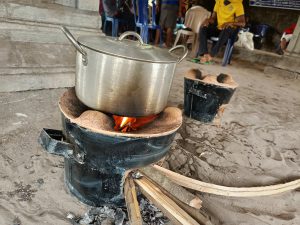
Enyenemkpo said while the use of the fuel efficient stove will contribute to reducing environmental pollution, relevant authorities should save their environment by putting a stop to gas flaring and oil spillage in Ibeno.
Women leader of Okoroutip Community, Mary Williams who expressed delight over the training noted that they hope to expand on the knowledge impacted by making a similar stove for their fish drying business.
Youth president of Okoroutip, Nsoh Nsoh said the communities are delighted over the fact that the resources for making the stove are easily accessible by them.
He added ” At first, during the training, we weren’t sure of the effectiveness, but now, we have seen that this is better than other sources of fuel we use.
” The good thing is that we can now make it on our own. We can train others and we are planning to expand it into our fish drying business even making it to sell”.

